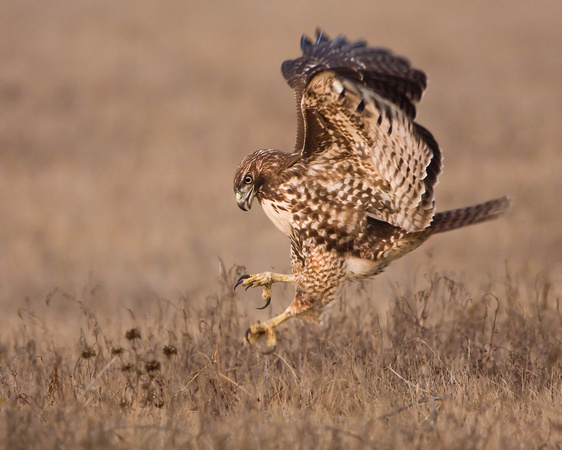Podcast: Play in new window | Download
Subscribe: RSS

The Great Predator makes a selection. Does he also bring a gift? (Photo by featherlightphoto.com)
I have not lately spent as much time afield in search of nature’s lessons as I once did. Nature has responded by striding up to my recliner and dumping lessons in my lap. She’s like that: maddeningly impervious to urgent investigation, then suddenly extroverted when your attention wanders.
The other day I was observing the one ritual that remains inviolable in our household — happy hour — from my perch on the second-floor deck that overlooks the east pasture. It has been a remarkable summer here, with no heat waves (half the days in August we did not even turn on the air conditioner), and rains frequent enough that the grass is lush and the roads are not dusty. This long spell of perfect weather, I have decided, has been given to me by the universe so that I can think and write more objectively about global warming.
It was in the late afternoon of one of these standard, splendid summer days that I happened to lift my eyes from my book in time to spot the red-tailed hawk, high above the pasture, just as he tucked his wings and fell like an arrow to the grass far below. Just before impact he flared his wings, stretched out his talons, and plucked a vole clean out of the timid little critter’s dreamy summer afternoon. Then the hawk thrashed his way back into the air and was soon soaring upward and away.
The hawk had the vole gripped by the shoulders, holding the little fellow upright as they soared away to dinner, and the vole seemed to me to be looking avidly around at the marvelous panorama of his former habitat, now spread out below him as he had never seen it before. I’m pretty sure that’s what he was doing.
I found myself hoping that on the day the Great Predator decides to pluck me from my happy hour, he gives me a final look at the state of being I’m leaving behind, from the perspective of the transit to next one. (Veterans of near-death experiences talk about floating to the ceiling and observing their own inert bodies below, but I’m not talking about that, I’m talking about space travel, about the equivalent of the first view of blue-marble earth from the moon.)
I think I would ignore the bite of his talons on my shoulders if he gave me a view of my life in its entirety, of life itself in its entirety, compared and contrasted with the contours of eternity, visible to me for the first time from my unprecedented altitude. Would that not make the final seconds interesting?
Then what? Then the worm becomes the butterfly, the vole becomes the red-tailed hawk, the beat goes on.
Thank you, Madam Nature, for the lesson, and especially for the home delivery.
Well versed, and for once no politics.
Beautiful Tom! Wow. You took me on a journey with this piece. We live in an insane, death denying culture. As if it is something unnatural and terrible. This kind of writing is so rare and very much needed. A while ago, I tried to coax you back into writing this blog(where for art thou) after a long absence and this is why. Thanks so much for your inspired prose.
You have shared many good thoughts over the long haul, and I’m grateful.
Ah Mr. Lewis, that was sublime. I hope you keep your self-promise (to write more about climate change because the weather has been so out-of-the-ordinary pleasant).
You put it together like a poet, rather than a scientist, though you at least represent what is being said so it’s scientifically valid.
Enjoy the fleeting reverie, for as long as it lasts.
If Guy McPherson is half right about global warming -and two thirds of me thinks he is- all are destined to be plucked by the Great Predator sometime before the year 2030.
Seven plus billion souls, that’s a possible seven plus billion flights! The Great Predator could well be one Busy Beaver in the coming decade.
I am a physical scientist so my view of the operations of civilization are couched in technical terms rather than in Tom Lewis’s. So the technical systems of industrialized civilization irreversibly use up irreplacable natural material resources, produce irrevocable wastes and degrade the environment in their limited life times. This is an unsustainable process that global society will have to try to deal with as it power down in coming decades.
Mr Lewis, someone told me that somewhere over the rainbow, way up high, there’s supposed to be a land I once heard of in a lullaby. It’s a place where everyone genuinely cares about each other and about the environment and therefore detests the endless pursuit of mammon, so that there are no such things as global warming, peak oil etc.
Will the Great Predator you spoke of bring me there, huh? Will he? :D
If he does I wanna go too!